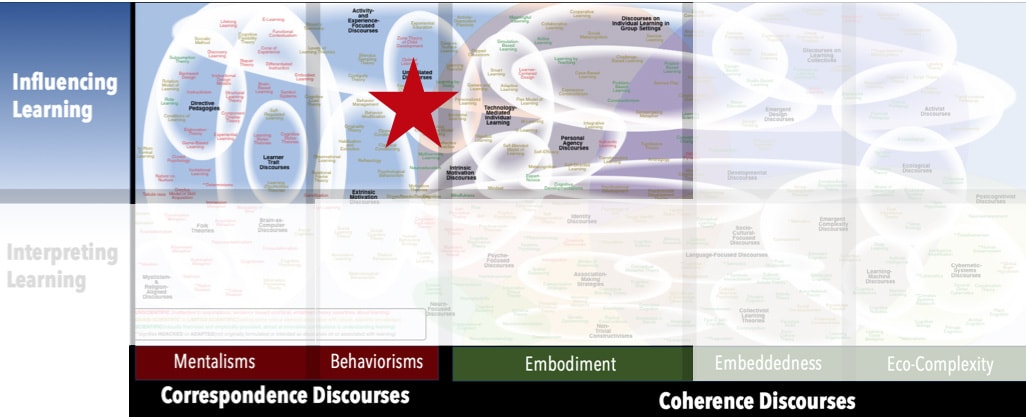AKA
Optimal Experience
Focus
Strategies and emphases intended to support the best learning possiblePrincipal Metaphors
As noted below, Optimal Learning is claimed by (or associated with) a range of incompatible perspectives. It is thus impossible to point to a core set of metaphors. However, with regard to its common alignment with Positive Psychology in the education literature, the following cluster of associations is typical:- Knowledge is … functioning
- Knowing is … flourishing
- Learner is … feeling-driven agent
- Learning is … meaning-making
- Teaching is … orienting
Originated
2000sSynopsis
Optimal Learning is a contested term, used to refer to methods and emphases that are drawn from or informed by a variety of sensibilities. Perhaps most prominently, it is associated with Positive Psychology and it is used to signal attendance to diverse learners’ emotional intellectual, and physical needs within responsive, safe, and academically rigorous environments. Closely related, Optimal Learning is sometimes used to refer to the learning that can happen when in a Flow state. In quite a different vein, the phrase is commonly used to describe teaching emphases associated with Cognitivism, such as Brain-Based Learning and Differentiated Instruction. Outside education, Optimal Learning refers to strategies for collecting information to make well-informed choices in complex settings. In most cases, models of Optimal Learning are associated with some version of Negative Learning, which is subject to a similar range of interpretation. Some examples include:- Negative Learning (popular) – reaching or applying a flawed conclusion, typically because of inaccurate information or hasty inferences
- Negative Learning (Alfie Kohn, 2000s) – using a negative situation as an occasion to learn what to avoid or what not to do
- Positive Learning and Negative Learning (PNL Model) (Chris Bakker, 2010s) – defines Negative Learning as a contrast to highly motivating, engaged activity (i.e., Positive Learning), emphasizing the adverse consequences of stress, underdeveloped resources, distractions, etc.
- Negative Learning Environment (popular) – a context that adversely influences learning
- Negative Learning Experience (popular) – a fraught situation in which relevant or useful learning nonetheless happens
- Negative Learning Transfer (Negative Transfer) – when a previously learning interferes with, complicates, or frustrates a new learning
- Aptitude-Treatment Interaction Theory (Lee Cronbach, Richard Snow, 1970s) – the perspective that Optimal Learning (in the sense of “best learning possible”) will happen with the mode of instruction is matched to learner aptitudes and learning styles.
- Cognitive Efficiency (B. Hoffman, G. Shraw, 2010s) – the relationship between one's performance and one's effort, often expressed in terms of optimal/maximum achievement or optimal/minimum effort
- 85% Rule for Optimal Learning (Robert Wilson, Amitai Shenhav, Mark Straccia, Jonathan Cohen, 2010s) – the empirically based suggestion that there is an optimal level of difficulty for motivating learning – namely, a ratio of about 85% accuracy/success to 15% error/failure. Greater success might be associated with a lack of challenge; greater failure might trigger excessive frustration.
Commentary
The notion of “optimal” is invoked by many discourses on learning and biological functioning. Indeed, it is so common that a category has been named:- Optimal Level Theory – an umbrella category that applies to any theory that assumes or asserts the possibility of optimal functioning in some aspect of a living system’s existence
Authors and/or Prominent Influences
DiffuseStatus as a Theory of Learning
Optimal Learning is not a theory of learning.Status as a Theory of Teaching
Optimal Learning is most commonly used to refer to clusters of learner-centered teaching emphases.Status as a Scientific Theory
The notion of Optimal Learning is simply too contested to be categorized as scientific. Even when used in association with well-developed, empirically grounded perspectives (e.g., Flow), the meaning of the phrase is fraught – as any claim to optimality (i.e., best-ness) in relation to the complex phenomenon of learning is almost certainly hyperbolic.Subdiscourses:
- Aptitude-Treatment Interaction Theory
- Cognitive Efficiency
- 85% Rule for Optimal Learning
- Negative Learning
- Negative Learning Environment
- Negative Learning Experience
- Negative Learning Transfer (Negative Transfer)
- Optimal Level Theory
- Positive Learning and Negative Learning (PNL Model)
Map Location

Please cite this article as:
Davis, B., & Francis, K. (2024). “Optimal Learning” in Discourses on Learning in Education. https://learningdiscourses.com.
⇦ Back to Map
⇦ Back to List
